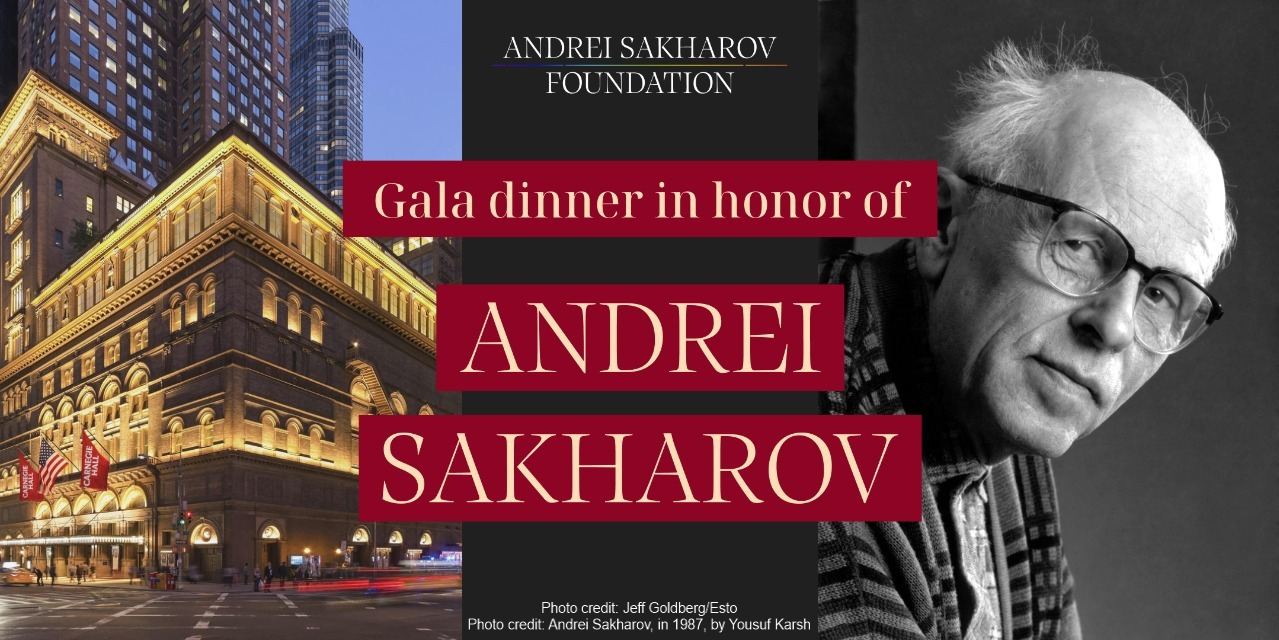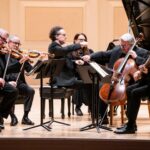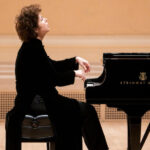The Carnegie Hall published their new season program, which includes a concert organized by the ASF in honor of Andrei Sakharov.
“An astonishing lineup of internationally renowned musicians comes together to celebrate the centenary of Andrei Sakharov — physicist, humanist, and Nobel Peace Prize winner for championing universal human rights, disarmament, and peace, in whose name the European Union established the Sakharov Prize for Freedom of Thought.”

The ASF is immeasurably grateful to our amazing artists for their generosity:
Maxim Vengerov, Violin
Steven Isserlis, Cello
Evgeny Kissin, Piano
Lera Auerbach, Piano
Emerson String Quartet
— Philip Setzer, Violin
— Lawrence Dutton, Viola
— Paul Watkins, Cello
We are also very thankful to Sir Clive Gillinson, Ms Ann Weber and the entire team at Carnegie Hall for their outstanding professionalism and great support they’ve given us.
As one of the most influential humanists and scientists of the 20th century, Andrei Sakharov continues to be acclaimed throughout the world, one hundred years after his birth.
Awarding him the Nobel Peace Prize in 1975, the Nobel committee called him “the conscience of humanity.”
The European Union created the highest tribute paid to human rights work, and each year it honors recipients with the Sakharov Freedom of Thought Prize. The American Physical Society biannually awards the Andrei Sakharov Prize to scientists for “outstanding leadership and achievements in upholding human rights.” The Russian Academy of Sciences awards a golden Sakharov medal for outstanding research in particle physics. Avenues and institutes in many countries are named after Sakharov and several cities are graced by statues of him.
Initially known as the father of the Soviet hydrogen bomb, Sakharov captured the imagination of millions around the world when in 1968 he wrote Reflections on Progress, Peaceful Coexistence and Intellectual Freedom, which became one of the world’s most published books.
Realizing that he was instrumental in creating the most powerful weapon in history, Sakharov began studying the consequences of nuclear testing, writing about the radiation impact on humans and nature. He urged governments to ban all but underground nuclear tests and became one of the initiators of the Treaty Banning Nuclear Weapons Tests in the Atmosphere, in Outer Space, and Under Water signed in Moscow (1963).
In December 1975 the Nobel Committee noted Sakharov’s great contribution to peace, the values that the Helsinki Final Act declares to be its objective, and awarded the Nobel Peace Prize “to one of the great champions of human rights in our age… Uncompromisingly and with unflagging strength Sakharov has fought against the abuse of power and all forms of violation of human dignity, and he has fought no less courageously for the idea of government based on the rule of law…”
Sakharov continued his struggle for human rights, disarmament, and cooperation between nations. He tried to involve the US Congress, President Carter and Amnesty International. He gave interviews to foreign correspondents, published timely relevant articles “The World in Fifty Years” “My Country and the World,” and “Alarm and Hope.”
In several 1979 interviews, he condemned the Soviet invasion of Afghanistan. As a result, he was stripped of all state awards by administrative order and exiled to Gorky, a city that was closed to outsiders by the Soviets because of its strategic importance as a military industrial center.
Released from his seven-year exile by President Gorbachev, Sakharov returned to Moscow in December 1986. He traveled abroad to continue his work for peace, meeting with renowned scientists, heads of states, and other dignitaries.
“Sakharov was my hero for as long as I can remember,” explains Evgeny Kissin. “As soon as the idea of organizing a concert to honor him came about, I was fully committed. I contacted the other artists, and we put together a program. We had to postpone the concert because of the pandemic. Fortunately, the Andrei Sakharov Foundation was really dedicated, while Carnegie Hall was incredibly supportive of the idea, so the concert is going ahead, two years after his centennial. His ideas and moral authority are ever more relevant today.”
The star-studded concert will take place on May 21, 2023, Sakharov’s 102nd birthday. “This historic concert is unmissable,” confirms Carnegie’s director Clive Gillinson.




